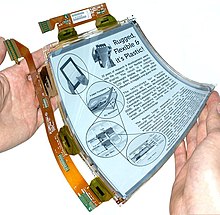| Founded | 2000 |
|---|---|
| Founders |
|
| Headquarters | Dresden , Germany |
| Products | Development and manufacture of glass-free, flexible EPD |
| Website | www |
Plastic Logic Germany develops and manufactures electrophoretic displays (EPD), based on organic thin-film transistor (OTFT) technology,[1][2] in Dresden, Germany.
Originally a spin-off company from the Cavendish Laboratory at the University of Cambridge, the company was founded in 2000 by Richard Friend,[3] Henning Sirringhaus[4] and Stuart Evans[5] and specialised in polymer transistors and plastic electronics.
In February 2015, the company announced that the technology development and manufacturing parts of Plastic Logic would be separated and would go forward as independent companies, in order to generate focus while addressing a range of opportunities available in identified markets.[6] The manufacturing plant in Dresden, Germany, which develops, manufactures and sells a range of flexible EPD, operates independently under the name Plastic Logic Germany.[7]


Plastic Logic opened the first mini-fabrication plant on November 11, 2003 in Cambridge, UK.[8] A factory for the mass-production of the display units was opened on September 17, 2008 in Dresden, Germany.[9]
Plastic Logic announced its first plastic screen device on November 30, 2004, to be used by Siemens Communications in their mobile devices.[10] This was followed by the announcement of an ereader called the QUE proReader. However, by August 2010, they had cancelled the QUE proReader.[11] In September 2011 the company announced Plastic Logic 100 aimed to bring e-textbooks to Russian schools.[12]
In January 2011 the company received $280m in venture capital: $230m into the equity of Plastic Logic from Rusnano and $50m from Oak Investment Partners, a multi-stage venture capital firm.[13] In May 2012 Plastic Logic revealed a ‘Plastic Inside’ strategy – selling its plastic back-planes, sensors and tags for customers to incorporate into other products.[14]
On May 17, 2012, Plastic Logic announced that they were abandoning plans to manufacture their own e-reader devices (focusing instead on licensing their existing technology), shutting down their US office in Mountain View, California, and reducing staff elsewhere.[15][16][17][18]
In July 2012, Plastic Logic demonstrated a flexible display that was 130 μm thick, as well as the first flexible plastic display that can play colour video animation content at 12 frames per second (14 fps in black and white), driven by OTFTs (organic thin film transistors).[19] Plastic Logic also demonstrated several product concepts including an ultra-thin e-paper companion device for a smartphone. The 10.7” touchscreen pane for viewing of webpages and documents was designed for easier reading of content than on the screen of a smartphone.[20][21]
BBC Click featured Plastic Logic's technology in a report on "going paperless" in July 2012.[22][23]
- ^ "All-Plastic Electronics Power Flexible Color Display". 7 June 2012.
- ^ "Plastic Logic Shows Off New 10.7 Colour Display Screen". 4 September 2012.
- ^ "Plastic Logic chief receives knighthood". 16 June 2003.
- ^ "Professor Henning Sirringhaus".
- ^ "Chip innovator sets its sights high". 18 April 2008.
- ^ "The Launch of FlexEnable".
- ^ "FlexEnable Split Off from Plastic Logic".
- ^ "Plastic Logic opens the world's first Plastic Electronics Mini-Fab". Plastic Logic. Archived from the original on 15 December 2003. Retrieved 17 August 2010.
- ^ "Plastic Logic Opens Plastic Electronics Manufacturing Factory in Germany". 17 September 2008.
- ^ "Plastic Logic to develop flexible displays for Siemens Communications". Plastic Logic (Press Release). Archived from the original on 7 February 2005. Retrieved 17 August 2010.
- ^ Walters, Richard (11 August 2010). "Plastic Logic abandons long-delayed e-reader". FT.com. Retrieved 17 August 2010.
- ^ O'Brien, Terrence (2011-09-13). "Plastic Logic 100 unveiled, set to bring e-textbooks to Russian schools". Engadget. Retrieved 13 September 2011.
- ^ "RUSNANO Finalizes Investment in Plastic Logic". Press-release. 18 January 2011.
- ^ "Plastic Logic goes for 'Plastic Inside' strategy". 16 May 2012.
- ^ Fingas, John (May 17, 2012). "Plastic Logic shutters US offices, gets out of making its own e-readers". Engadget.
- ^ "Plastic Logic Exits E-Reader Business It Never Really Managed to Enter". All Things D. May 17, 2012. Retrieved September 7, 2012.
- ^ "Plastic Logic quits ereaders and turns to tech licensing". Slashgear. May 16, 2012. Retrieved September 7, 2012.
- ^ "A logical step". +Plastic Electronics. August 24, 2012.
- ^ "Plastic Logic offer in-depth look at plastic electronics technology". Printed Electronics World. 2 July 2012.
- ^ "Plastic Logic flexible smartphone companion hands on". Slashgear. 28 June 2012.
- ^ "Plastic Logic reveals smartphone display accessory concept at open day". Plus Plastic Electronics. 28 June 2012.
- ^ "Showing the future for a paperless office". 12 July 2012.
- ^ "BBC Click (BBC iPlayer TV programme - available to play in the UK only)". 8 July 2012.
